
When markets fail people, then the people need to replace the market. Ir, to put it more directly: when a profitable grocery store isn’t profitable enough for a company then small towns need to buy that grocery store and turn it into a publicly owned asset which keeps the community alive. That’s what small towns in the USA are starting to do. By saving their local, downtown, grocery stores they keep people employed, returning to the town, and overall make life easier for everyone. The future of America might be the small box store.
The city hadn’t had a full-scale grocery store since 1985, and Giefer decided to change that. In 2008, he used city funding to get a new store, St. Paul Supermarket, off the ground. In 2013, when the couple who ran the store was staring down retirement, Giefer convinced the city to buy it outright.
In 2019, Schoenhofer drove to St. Paul to meet with that city’s clerk, who gave her some tips. The experiment, Schoenhofer found, had been a success. The St. Paul grocery employs ~15 people, and it turns a profit of 3%, slightly better than the average for rural grocery stores.
It has also kept people — and spending money — in town. Similarly, in Erie, residents show up to Erie Market for fresh lunches, like a BBQ pulled-pork sandwich or a taco on Taco Tuesday.

